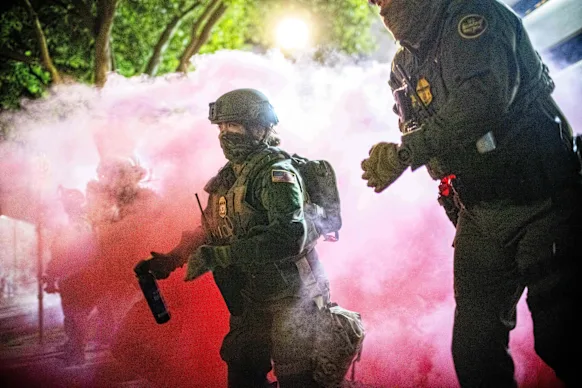Judge’s Ruling Sparks Controversy Amid Ongoing Protests in Portland
In a significant legal development, U.S. District Judge Karin Immergut has issued a temporary restraining order that restricts the Trump administration from deploying National Guard troops from other states to Portland, Oregon. This ruling comes amid ongoing protests near an Immigration and Customs Enforcement (ICE) facility, raising questions about the balance between law enforcement and civil liberties.
Background of the Protests
The protests in Portland have been a focal point of national attention, particularly since the summer of 2020, when demonstrations erupted following the death of George Floyd. During that period, federal agents were dispatched to the city to quell unrest, leading to widespread criticism and accusations of excessive force. The current protests, while smaller in scale, are concentrated around the ICE facility in South Portland and have drawn a mix of supporters and detractors.
Scott Asphaug, a former colleague of Immergut, emphasized her commitment to justice during her tenure as Oregon’s chief federal prosecutor. He noted that her approach was not merely about winning cases but about acting judiciously. “Our job was to act in a judicious and just manner,” Asphaug stated, reflecting the ethos that Immergut has carried into her judicial role.
The Legal Battle
During an emergency hearing on Sunday night, Immergut clarified her restraining order, emphasizing that the administration could be in “direct contravention” of her ruling if it proceeded to send troops from states like Texas and California. “Aren’t defendants simply circumventing my order?” she questioned, highlighting the legal complexities surrounding the deployment of military forces in domestic situations.
The judge’s ruling is particularly noteworthy given the historical context of federal involvement in local law enforcement. The use of federal troops in domestic protests has been a contentious issue, often drawing parallels to the civil rights movement of the 1960s when federal intervention was necessary to uphold citizens’ rights.
Diverging Perspectives
While Immergut’s ruling has garnered attention, opinions on the protests and the government’s response vary widely. Attorney General Bill Barr’s decision to send federal agents to Portland in 2020 was met with fierce opposition, and the current protests have been described by some, including local attorney Williams, as “vastly different” from the chaotic scenes of the past. Williams noted that while parts of downtown Portland resembled a “war zone” in 2020, the current protests are more contained and focused.
“I don’t fault ICE for doing their work,” Williams remarked, emphasizing the importance of maintaining law and order while allowing citizens to express their dissent. This sentiment reflects a broader debate about the role of law enforcement in a democratic society, particularly in the context of protests that challenge governmental policies.
The Political Fallout
The political ramifications of Immergut’s ruling have not gone unnoticed. The Trump administration has appealed her decision to the 9th U.S. Circuit Court of Appeals, indicating a willingness to challenge judicial authority. In a statement, Trump criticized Immergut, suggesting that her ruling was an attempt to “nullify the 2024 election by fiat.” He expressed frustration over his judicial appointments, stating, “if they put judges like that on, I wasn’t well served by the people who picked judges.”
Interestingly, Trump’s comments also revealed a lack of awareness regarding Immergut’s gender, as he repeatedly referred to her as “he” and “him.” This oversight has sparked discussions about gender representation in the judiciary and the broader implications of such mischaracterizations in political discourse.
The Road Ahead
As the legal battle unfolds, the temporary restraining order issued by Immergut is set to expire later this month, with a trial scheduled for October 29. The outcome of this case could have lasting implications for the relationship between federal and state authorities, particularly in the context of civil unrest.
The ongoing protests in Portland serve as a microcosm of a larger national conversation about immigration, law enforcement, and the rights of citizens to assemble and protest. As the situation develops, it remains to be seen how the courts will navigate these complex issues and what precedent will be set for future interactions between federal forces and local communities.
Conclusion
Judge Karin Immergut’s ruling against the Trump administration’s plans to deploy National Guard troops to Portland has reignited debates about the role of federal authority in local matters. As protests continue and legal challenges mount, the balance between maintaining order and respecting civil liberties remains a critical issue. The upcoming trial will likely shape the future of federal involvement in domestic protests and set important legal precedents for years to come.










